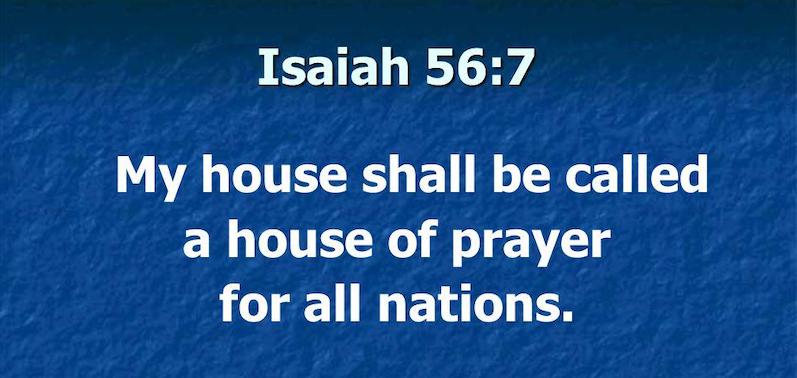Yeshua’s relatively short life on this earth was revolutionary. He not only came to fulfill the messianic prophecies and to be the final sacrifice for sin but He also came to show us the genuine heart of God and to open wide the door of salvation to the nations. We see a clear example of this on the day that Yeshua entered the Temple and overturned the tables:
Then they came to Jerusalem. And He entered the temple and began to drive out those who were buying and selling in the temple, and overturned the tables of the money changers and the seats of those who were selling doves; and He would not permit anyone to carry merchandise through the temple. And He began to teach and say to them, “Is it not written, ‘My house shall be called a house of prayer for all the nations’? But you have made it a robbers’ den.” The chief priests and the scribes heard this, and began seeking how to destroy Him; for they were afraid of Him, for the whole crowd was astonished at His teaching. – Mark 11:15-18
While admonishing those who were profiting from the worship of God, Yeshua quoted from the prophet Isaiah to remind His listeners that true worship of God was to be pure and available to all of the nations of this world, “…My house shall be called a house of prayer for all the nations…”.
Judaism in the days of Yeshua, including some aspects of worship at the Temple, had lost its true purpose. Yeshua had come to set the record straight and to open wide the door for Jews and non-Jews alike to come to the Father through the New Covenant that Yeshua Himself would literally become. The inclusion of the Gentile nations in the blessings of Israel are actually part of the blessings that Jacob gave to his twelve sons before he departed this earth.

The Life & Legacy of Jacob (Israel)
We read in the first verse of this week’s Torah Portion that Jacob lived to be 147 years old (Gen. 47:28). Before Jacob passed from this life, he blessed his twelve sons with prophetic blessings which would speak of their future:
Then Jacob summoned his sons and said, “Assemble yourselves, so that I may tell you what will happen to you in the days to come. – Gen. 49:1
When Jacob stated that he would tell his sons what would happen to them “in the days to come”, the Hebrew text literally reads, באחרית הימים – BeAcharit Hayamim – in the end of days. Translating this phrase as “…in the days to come…”, as in the quoted verse above, fits the context more accurately as we know that these prophetic words were not simply for the Last Days but for various times in the future depending on the individual prophecy given to each of the twelve sons.
In agreement with last week’s article, Why Bethlehem of Judah, we know that Judah rose above his brothers when he became a ransom (guarantee) for their youngest brother Benjamin. In Jacob’s blessing of Judah in this week’s reading, we see how Judah is elevated above his brothers and that a ruler would come from Judah:
As for you, Judah, your brothers shall praise you; your hand shall be on the neck of your enemies; your father’s sons shall bow down to you. – Gen 49:8
The scepter will not depart from Judah, nor the ruler’s staff from between his feet, until Shiloh comes, and to him shall be the obedience of the peoples. – Gen. 49:10
This prophecy has come to fruition in various ways including when David, from the tribe of Judah, was crowned king over Judah as well as over all of the tribes of Israel. The “scepter” continued in the line of Judah until we see the ultimate fulfillment in Yeshua as our Messiah and King. The true Leader has come forth from Judah. Yeshua fulfilled this prophecy when He entered the world as King of the Jews, however, the extension of the Kingdom of God to the nations was still to be realized.
The Blessing of Joseph
Although Jacob blessed Judah and set him over his brothers, we also read how Jacob blessed Joseph with the blessing of the firstborn:
Joseph is a fruitful branch, a fruitful branch by a spring; its branches hang over a wall. The archers provoked him, and shot at him and were hostile toward him; but his bow remained firm, and his arms were agile, from the hands of the Mighty One of Jacob (from there is the Shepherd, the Stone of Israel), from the God of your father who helps you, and by the Almighty who blesses you with blessings of heaven above, blessings of the deep that lies beneath, blessings of the breasts and of the womb. The blessings of your father have surpassed the blessings of my ancestors up to the furthest boundary of the everlasting hills; may they be on the head of Joseph, and on the top of the head of the one distinguished among his brothers. – Gen. 49:22-26
We know from the biblical text that Jacob loved Joseph more than all of his sons and this is again confirmed in his bestowing on Joseph the fruitful blessing of the firstborn just as Jacob had received from his father Isaac (Gen. 27:27-29).
The unique manner in which Jacob blessed both Judah and Joseph with a firstborn type of blessing giving them prominence above their brothers, has given rise to the concept of two out workings of the Messiah:
-
- Messiah son of Joseph
- Messiah son of Judah (David)
Messiah son of Joseph is portrayed as the Suffering Servant, just as Yeshua came at His first coming, while Messiah son of Judah (David) is portrayed as the conquering King, as Yeshua will appear at His return. To read more about the understanding of Messiah son of Jospeh click this link: The Hidden Messiah
The Double Blessing of Joseph
In addition to blessing Joseph as the firstborn, Jacob went a step further and claimed Joseph’s two sons, Ephraim and Manasseh, for himself:
Now your two sons, who were born to you in the land of Egypt before I came to you in Egypt, are mine; Ephraim and Manasseh shall be mine, as Reuben and Simeon are. – Gen. 48:5
In this act of counting Ephraim and Manasseh as his own sons, Jacob doubled Joseph’s portion in his inheritance in the Land of Promise (Joshua 14:4). Ephraim and Manasseh were both considered tribes in Israel and they both received portions in the Land (Joshua 16 & 17).
Ephraim and Manasseh were granted unique status among the sons of Jacob when he gave them the positions of his first and second born sons in place of Reuben and Simeon. In essence, Jacob gave the blessing of the firstborn to four different people: to Judah, to Joseph, to Ephraim, and to Manasseh.
The Blessing of Ephraim
The complexity of the blessing of the firstborn becomes even more interesting as we read that Jacob chose to place Ephraim above Manasseh when he blessed them and took them as his own:
But Israel reached out his right hand and placed it on the head of Ephraim, who was the younger, and his left hand on Manasseh’s head, crossing his hands, although Manasseh was the firstborn. – Gen. 48:14
By placing his right hand on Ephraim’s head for the blessing, Jacob (Israel) put Ephraim above Manasseh, and granted Ephraim the right of the firstborn. Therefore, Manasseh did not receive the blessing of the firstborn but he was included in the tribes of Israel.
Why did Jacob put Ephraim above Manasseh? The text does not tell us explicitly why Jacob did this, however, I think the meaning of their names contributed to this decision. Manasseh, Joseph’s firstborn son, was given his name because Joseph thanked God for letting him forget the difficulties in his past regarding his father’s house. We read the following explanation a few chapters earlier in Genesis chapter forty-one:
Joseph named the firstborn Manasseh; “For,” he said, “God has made me forget all my trouble and all of my father’s household.” – Gen. 41:51
Joseph endured rejection by his family, was sold into slavery, and spent thirteen years of his life either as a slave or a prisoner. Joseph had started a new life after he was promoted in Pharaoh’s kingdom and he wanted to forget his father’s household including all of the pain that they caused him. Manasseh, Joseph’s firstborn son, was so named as a way to forget the pain of the past represented by his father’s household.
On the other hand, in a more positive and forward looking manner, Joseph named his second born son Ephraim, thanking God for making him fruitful in the land of affliction:
And he named the second Ephraim; “For,” he said, “God has made me fruitful in the land of my affliction.” – Gen. 41:52
The name Ephraim has the meaning of “I am doubly fruitful.”
In understanding the meaning of these two sons of Jacob it seems clear why Jacob would put Ephraim above Manasseh. Jacob did not want his memory nor the promises that God gave to his fathers (Abraham and Isaac) to be forgotten, rather, Jacob wanted to focus on the blessing and fruitfulness of God, therefore, he chose Ephraim to carry the blessing forward. In essence by choosing Ephraim over Manasseh, Jacob was declaring to Joseph and their descendants: “Do not forget the promises of God!”
We then see how Jacob emphasized the promises of God in his closing blessing over Ephraim and Manasseh when he stated how God would return them to the Land of Promise:
When Joseph saw that his father placed his right hand on Ephraim’s head, it displeased him; and he grasped his father’s hand to move it from Ephraim’s head to Manasseh’s head. And Joseph said to his father, “Not so, my father, for this one is the firstborn. Place your right hand on his head.” But his father refused and said, “I know, my son, I know; he also will become a people and he also will be great. However, his younger brother shall be greater than he, and his descendants shall become a multitude of nations.” So he blessed them that day, saying, “By you Israel will pronounce blessing, saying, ‘May God make you like Ephraim and Manasseh!’” And so he put Ephraim before Manasseh. Then Israel said to Joseph, “Behold, I am about to die, but God will be with you, and bring you back to the land of your fathers. – Gen. 48:17-21
The promise of God to bless the descendants of Israel, to make them a great nation, and to give them the Land of Promise was at the forefront of Jacob’s thoughts when he blessed Joseph through his two sons, Ephraim and Manasseh.

The Extended Blessing of Ephraim
When Jacob responded to Joseph regarding his decision to reverse his hands and place his right hand on Ephraim’s head (the younger) and his left hand on Manasseh’s head, Jacob stated the following:
But his father refused and said, “I know, my son, I know; he also will become a people and he also will be great. However, his younger brother shall be greater than he, and his descendants shall become a multitude of nations.” – Gen. 48:19
Jacob purposely placed Ephraim above Manasseh and stated that Ephraim would become greater than Manasseh and that “…his descendants shall become a multitude of nations.” In Hebrew this phrase is literally וזרעו יהיה מלא הגוים – VeZaro Eeyeh Meloh Goyim – and his seed will be the fullness of the nations. Time and space do not allow for a full study on the various ways that the blessing of Ephraim was fulfilled both physically and spiritually, however, I will highlight a few fulfillments here.
Joshua, the servant of Moses and the second spy who gave a good report together with Caleb, was from the tribe of Ephraim. The tribe of Ephraim became great in Israel and literally became synonymous with the northern kingdom of Israel as we see illustrated in the book of Hosea:
I know Ephraim, and Israel is not hidden from Me; because now, Ephraim, you have been unfaithful, Israel has defiled itself. – Hosea 5:3
Ephraim represented all of the tribes of Israel in the northern kingdom. We read in the Bible that Rehoboam, King Solomon’s son, was made king before all of Israel in Shechem of Ephraim while the kingdom was still united (1 Kings 12:1). Shortly after Rehoboam became king, the kingdom of Israel was divided into the northern (Israel) and southern (Judah) kingdoms. Jeroboam became king of Israel (the northern kingdom) and lived in Ephraim, “Then Jeroboam built Shechem in the hill country of Ephraim, and lived there.” (1 Kings 12:25a). Ephraim was elevated above his brothers and above the other tribes as chief of the tribes of Israel. This being true, in what manner would the seed of Ephraim be “the fulness of the nations” as we read in the blessing of Ephraim?
We know that the blessing and prophecy of Judah is fulfilled through Yeshua the Messiah who came from the line of David and the tribe of Judah. The Messiah was born into this world to redeem all of the tribes of Israel, however, His mission also extended beyond the people of Israel to all the nations of the world, as we read in the prophet Isaiah:
He says, “It is too small a thing that You should be My Servant to raise up the tribes of Jacob and to restore the protected ones of Israel; I will also make You a light of the nations so that My salvation may reach to the end of the earth.” – Isaiah 49:6
The extended mission of the Messiah to be a light of the nations and to bring the salvation of God to the ends of the earth is a perfect fulfillment of the blessing of Ephraim. The nation of Israel has always been God’s chosen people but God’s heart is for all of the nations of the earth to know Him and to know His salvation through His Son Yeshua.
The Fullness of the Nations
Although Yeshua was born in Bethlehem of Judah (in the southern kingdom) He was raised in Nazareth in the northern territory of Israel (also called Ephraim). It is in this dual residency that Yeshua fulfills the blessing of Judah and the blessing of Ephraim in becoming the Savior to Jew and Gentile alike.
When the apostle Paul gave his testimony in Caesarea before King Agrippa and Festus, he concluded with the following statement:
“So, having obtained help from God, I stand to this day testifying both to small and great, stating nothing but what the Prophets and Moses said was going to take place; that the Messiah was to suffer, and that by reason of His resurrection from the dead He would be the first to proclaim light both to the Jewish people and to the Gentiles.” – Acts 26:22-23
We are still seeing the blessing of Judah and Ephraim being fulfilled in our days. The light of Yeshua continues to be proclaimed to Jew and Gentile alike and is continually extending to the ends of the earth.

God loves Israel and the Jewish people, however, His heart and His desire is for all of the nations of the earth to receive the blessing of Judah together with the blessing of Ephraim through the message of Yeshua:
And Yeshua came up and spoke to them, saying, “All authority has been given to Me in heaven and on earth. Go therefore and make disciples of all the nations, baptizing them in the name of the Father and the Son and the Holy Spirit, teaching them to observe all that I commanded you; and lo, I am with you always, even to the end of the age.” – Matt. 28:18-20
We are commanded to take part in the blessings of Judah and Ephraim by sharing the good news of Yeshua and making disciples of all the nations. Worship of God the Father was never meant to be confined to a certain location or to a particular people, but rather, taken to all of the world in order that the fullness of the nations may be realized for the glory of God. May 2021 be a year when the Body of Messiah takes seriously our responsibility to fulfill the blessing of Ephraim by making disciples of all nations!
Shabbat Shalom!
If you enjoyed reading this article, share it today with friends! We also invite you to sign up for our weekly Torah Portion commentary on the sidebar to the right.
Help keep our weekly commentaries free and available to all. Click here to donate today:
*All Scripture take from NASB Copyright © 1960, 1962, 1963, 1968, 1971, 1972, 1973, 1975, 1977, 1995 by The Lockman Foundation
**The Hebrew name “Yeshua” is used in the biblical quotations in place of the English name “Jesus” to give emphasis to the meaning of this name, salvation. The word “Messiah” is also used in place of the word “Christ” to bring clarity to the office of Yeshua.


